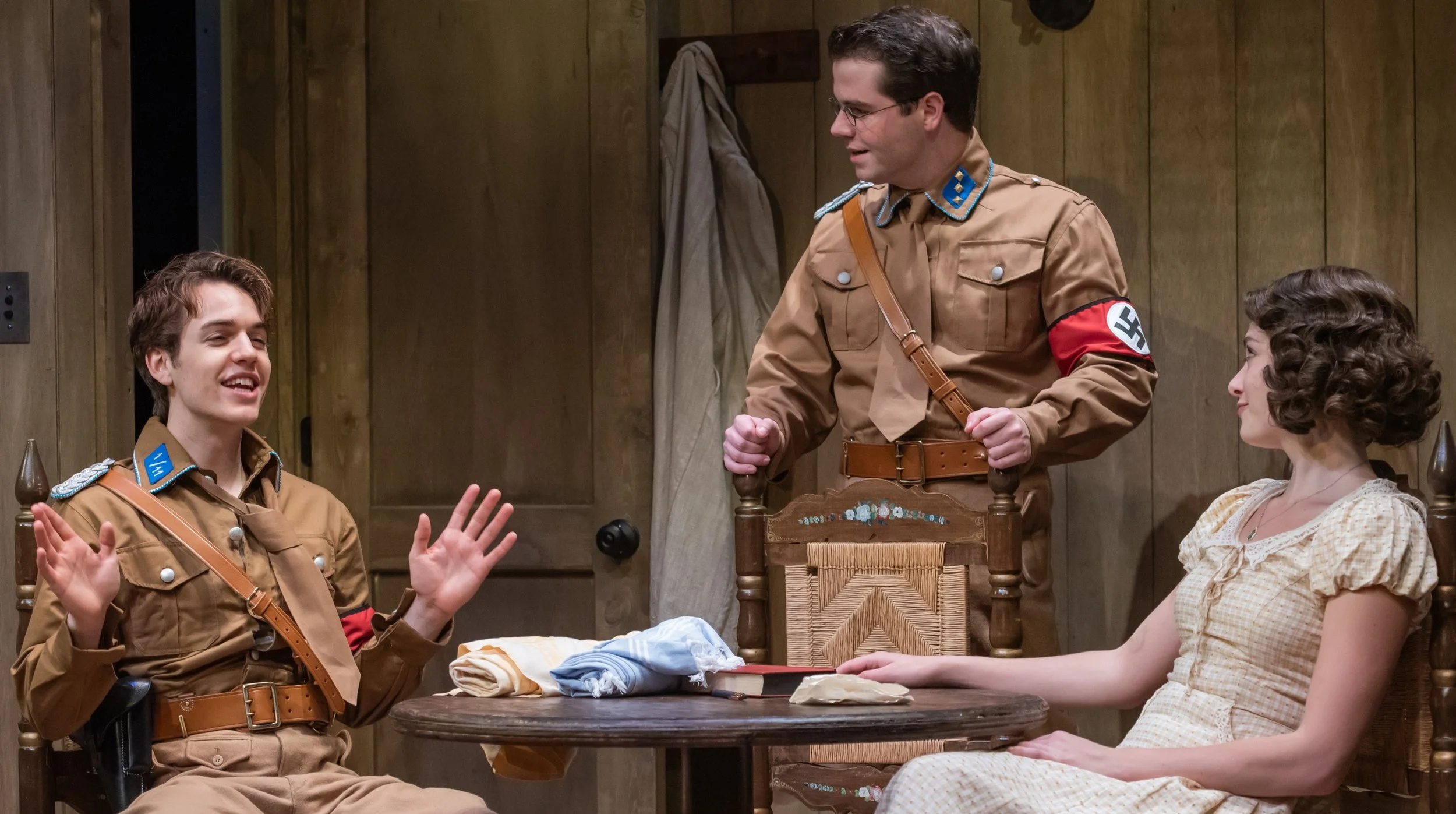Helmy Kluger (Gavin Michaels, left) shares a light moment with his sister Lexa (Ella Stevens) and Otto (Jack Mastrianni).
In her all-too-brief life, British author Sally Carson, who spent time in Germany prior to and after the Nazis’ rise to power, discerned a creeping fascism that would consume the country. Her 1934 novel Crooked Cross, and the stage version, produced in 1935 and 1937, echo Carson’s prescient warning of the hate and aggression that would propel Nazism into Europe.
Lexa (Stevens) and Moritz Weissmann (Samuel Adams) realize that their relationship is at risk.
Director Jonathan Bank faithfully retains Carson’s principal themes—the Nazis’ insidious seduction of youth searching for identity, community, and employment; German citizens’ desperate quest for prosperity that spurs blind obedience to Nazis; and an irrational hatred of Jews that spirals out of control, even among “progressive” Germans (and eventually threatens all non-Aryans).
When Dr. Moritz Weissmann (Samuel Adams), a Jewish convert to Christianity, visits his fiancée Lexa Kluger (Ella Stevens) and her family, he is warmly welcomed and helps decorate the Christmas tree. He notices a bonfire on a nearby mountain but soon announces that it is, rather, a “crooked cross”—a swastika. This sole reference to the crooked cross refers to the Nazi symbol but may also be a metaphor for Nazi ideology.
That ideology’s impact is evident as Moritz’s relationship with the Klugers slowly unravels, particularly when Helmy Kluger (Gavin Michaels) and his brother Erich (Jakob Winter) flaunt their Nazi uniforms. Kluger (Liam Craig), their father, although no fan of Jews, initially refuses Nazi party membership, much to his sons’ chagrin. Even he, though, is not immune to Nazi incentives for cooperation, and eventually yields under pressure. Frau Kluger (Katie Firth), ever the compliant one, is proud of her sons’ and husband’s choices.
Moritz (Adams, left) and Professor Weissmann, his father (Douglas Rees), contemplate their future as Jews in Nazi Germany. Photographs by Todd Cerveris.
Professor Weissmann (Douglas Rees), Moritz’s father, makes a Christmas appearance at the Klugers but is barely seen after that. At a formal evening with local dignitaries and Nazi brass, at which Moritz meets Lexa, he is publicly humiliated, forced to leave, and is increasingly socially isolated, including by Lexa’s family. They urge her to stop seeing him and propose Otto (Jack Mastrianni), a good Nazi and a family friend, as a suitable marriage candidate. Yet Lexa continues seeing Moritz secretly.
Although the play’s 1932–33 timeline precedes World War II and the infamous Nuremberg laws are not mentioned, Moritz, a highly respected doctor, cannot work. Thanks to Carson’s compelling script and Bank’s crisp direction, which keeps the action flowing, one can see where the characters are headed. Alexander Woodward’s rotating design space with its starkly contrasting sets underscores the Weissmanns’ diminished status. Helmy visits the cramped, squalid apartment that Moritz shares with his father. The foyer’s dirty white walls with its narrow bed, where Moritz sleeps, are cringeworthy in comparison with the Klugers’ comfortable interior and rustic country setting. However, the most chilling, incontrovertible reminder of the Aryan/non-Aryan divide occurs through sound (Sean Hagerty, sound designer) when the refrains of “Deutschland Über Alles”—Germany Above All, the Nazi anthem—waft through the Klugers’ window, adding a sinister overlay that subsumes any Bavarian charm.
Kluger (Liam Craig) and his wife (Katie Firth) worry about their future and that of their children.
The pace at which the harmonious Weissmann-Kluger and Kluger-Kluger (Lexa vs. her family) relationships deteriorate is rivaled by the pace at which the Kluger-Nazi party relationships accelerate. Only Helmy—and clearly not Erich—conveys mixed emotions in attempting to end Lexa’s relationship with the Weissmanns.
Are the Klugers bad people for buying into the prevailing anti-Jewish Nazi sentiments and wanting the best for Lexa, whose forced rupture from Moritz is backfiring? In their thinking, and perhaps even Moritz’s, for whom Lexa’s welfare is his primary concern, probably not. But a shooting at the border galvanizes the family’s edgy ambivalence:
Kluger: Who was it, d’you know? Local people?
Erich: I don’t know, except that one of the fellows who got shot was a Jew, someone said.
Kluger: Poor devils…
Erich: Dirty devils you mean, Father, scuttling out of the country with their pockets bulging with good marks we ought to have. Blast the lot of them, that’s what I say.
Frau K: They can’t help being Jews.
The Klugers are just simple, loyal country Germans, doing their best for Fuhrer and country, and trying to survive financially, but it’s implicit that Carson’s indictment of the Klugers’ pro-Nazi complicity is generalizable. Most Germans thought and acted similarly, resulting in disaster writ large.
In a program note, Bank notes that the play’s pre–World War II performances ruffled UK-based German diplomats, such that Carson had to backpedal her critique. In hindsight, though, she was clairvoyant, When intolerance and condemnation of “the other” prevail, it’s predictable that society will never be harmonious, even among the dominant and powerful.
Crooked Cross runs at Theatre Row (410 West 42nd St.) through Nov. 1. Performances are Tuesdays through Saturdays at 7 p.m.; matinees are at 2 p.m. on Wednesdays, Saturdays, and Sundays. No performance on Oct. 24. For more information, or to purchase tickets, call (212) 714-2442, ext. 45, or visit minttheater.org.
Playwright: Sally Carson
Director: Jonathan Bank
Lighting Designer: Christian DeAngelis
Set Designer: Alexander Woodward
Sound Designer: Sean Hagerty
Costume Designer: Hunter Kaczorowski






